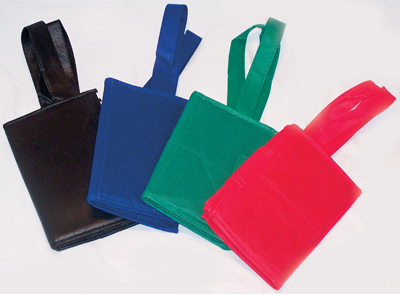
Fresh Trends: June 2009
May 29, 2009
By Michelle Brisebois
When belts tightened this year, many pundits predicted eco-friendly solutions would be one of the first casualties. Seriously, all of this tree hugging is expensive and the business world will gladly furlough green initiatives, at least until the panic is over – right? Not so fast.
When belts tightened this year, many pundits predicted eco-friendly solutions would be one of the first casualties. Seriously, all of this tree hugging is expensive and the business world will gladly furlough green initiatives, at least until the panic is over – right? Not so fast.
We got into this financial mess by sacrificing tomorrow’s stability for today’s immediate gratification and many consumers have taken these lessons to heart. Sustainability is the focus moving forward and, because green is here to stay, retailers need to think about which changes they need to make and also about how to implement these changes.
 |
|
| ZeroWaste Products’ reusable bags. Advertisement
|
Beginning in June 2009, the city of Toronto will make it mandatory for retailers to charge for plastic bags. Positive reinforcement administered as points or rebates to forgo plastic bags has gone only so far. Most customers were still leaving their canvas bags in the car and continuing to take plastic at the checkout. That little charge each time is more stick than carrot and intended to be more effective in diverting bags from landfills.
Other municipalities are sure to follow and many major grocery retailers are already charging a few cents each for bags in their stores across Canada. If your store is in Toronto, the decision has been made for you; but if you do business elsewhere, charging for plastic bags might be a tactic you’re considering.
Biodegradable bags are an option, too. These are designed to break down in the presence of light, oxygen and humidity to a lower quality of their original form. This process is different from composting, which means micro-organisms consume the bag.
Carol Zweep, Guelph Food Technology Centre’s packaging and labelling services manager, says most landfills don’t provide the optimal conditions for biodegradation to occur.
“Landfills don’t offer much in the way of oxygen, humidity or sunlight,” she says. “Archeologists have dug down in landfills and found fresh produce that hadn’t broken down over time. Less is best. It’s better to reduce the use of extraneous packaging at the outset.”
For bakeries relying on bags and boxes to get their beautiful creations from shop to home or event, plastic cake carriers and clamshell packages are staples. If the plastic is recyclable, isn’t that still OK?
“Often it comes down to dollars and cents,” Zweep says. “If one plastic in a bin has a different melting point than another plastic, that’s an issue for recycling. Sorting the plastics is very labour-intensive and therefore not very profitable. Unfortunately, most of it is ending up in the landfill anyway.”
So what options are available for bakeries looking to green up their packaging program?
ZeroWaste Products Inc. in British Columbia distributes a number of sustainable solutions, such as reusable and printable non-woven polypropylene bags. They fold up discretely with a Velcro closure, making them handy to keep in a purse.
“It’s hard for people to get into the habit of remembering to bring their own bags,” says ZeroWaste’s Dyanne Wayland. “Our bag can be carried along at all times and we can print a business logo and tagline on the bag. Now, in addition to it being a sustainable solution, it provides a bit of advertising for the retailer.”
For operations wondering what to do about plastic cutlery, ZeroWaste also distributes a line of biodegradable forks, knives and spoons called Aspenware WUN (Wood Utensils Naturally). This cutlery is made using a process that laminates and molds aspen and birch veneer into attractive spoons, forks and knives. The wood used in the manufacture of Aspenware comes from birch and aspen trees that have already been felled by the forestry industry and are lying in the wilds of B.C.
“The cutlery is very strong and the knives cut beautifully,” Wayland says.
The Aspenware production facility runs on hydroelectric power in an effort to minimize any carbon output.
“Paper is a good fallback when some type of packaging is needed,” Zweep says. “Cake boxes instead of plastic cake holders or clamshells are good options. Paper bags instead of plastic are a viable alternative for those who need something to carry their purchases.”
Should you decide to charge for plastic bags or eliminate plastic cake holders or clamshell packages from your operation, be prepared for a wide spectrum of reactions from customers and staff alike. Some will applaud your environmental stewardship and others will see it as an inconvenience at best or a money-grab at worst. Your front-line team may bear the brunt of customer frustration and there will be questions they’ll have to field.
Give customers a few weeks’ notice before implementing any changes or additional charges. Make sure you arm your staff with answers to questions such as, “Are you donating part of the money you’re charging for plastic bags to an eco-charity?”
Make your business mantra “less is more” and consider returning to simpler options. Sometimes progress means coming full circle.
Michelle Brisebois is a marketing professional who specializes in helping companies grow their brands. She can be reached at briseboismichelle@sympatico.ca
Print this page
Leave a Reply